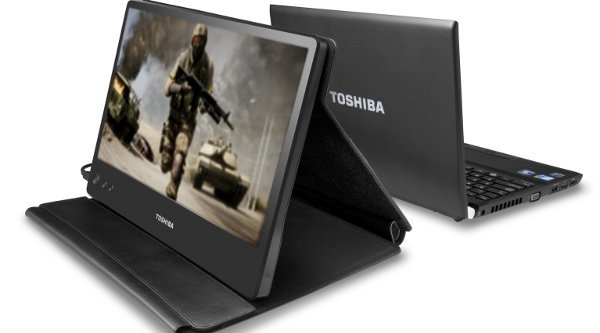Toshiba launches USB powered monitor

Remember when USB was for gamepads and mice? It seems that the future for the data transfer port includes fuelling low energy monitors.
Toshiba is the latest manufacturer to announce an LED screen which can be powered entirely from a standard USB 2.0 port. The cunningly named Toshiba USB LCD Mobile Monitor is exactly that, and while it's not what we'd normally look for in a gaming screen, there's a few things that make it look worth trying out.
For starters, this isn't the first USB powered monitor we've seen, that honour went to AOC a few months ago. But AOC's screens are desktop monitors which require the combined power of two USB ports to light up. Toshiba's rather smaller 14inch panel uses a single USB link to your PC, which also carries the video signal and allows for a small control panel built into the monitor surround for playing back media files.
The USB LCD Mobile Monitor is also very small; just 15.5mm thick and 795g. It's really not a screen designed for gaming, however. The resolution's only 1366x768, it's about half as bright as a desktop panel (220nits), the contrast ratio is just 400:1 and the response time is a lethargic 16ms. All these things would seem to be designed to reduce power consumption, for obvious reasons – the maximum total power draw must be below 3.15W to work across USB.
Three things really attract me, though. First off, the price. At £150/$240, if you can run games across both screens it could be a - niche - idea to buy two for triple head play on a laptop, or to carry to a LAN party and so on. The press shot above could be great for spectators.
Then there's what this might mean for the future. Making monitors ultra energy efficient is far more important to my mind than adding 3D and so on.
And finally, I miss the (very) old days when monitors plugged into an external power out port on the back of your PC, rather than the mains. One cable to the mains and everything daisy chained off of your desktop means fewer cables over all, and that means I'll finally stop tripping over that eight way mains adaptor that takes up most of the room under my desk and present a rather obvious fire hazard.
Keep up to date with the most important stories and the best deals, as picked by the PC Gamer team.

